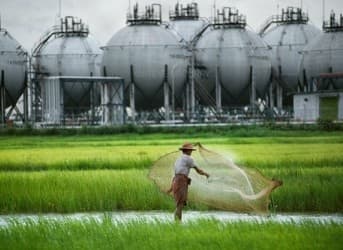Just when it seems that China has bought every energy asset on the planet, along comes Thailand’s PTT Exploration and Production Plc (PTTEP) to contest Beijing’s presence in one of Southeast Asia’s “final frontiers” – Burma, or, as its rulers prefer, Myanmar.
PTTEP expects soon to sign an agreement with Burma to explore for oil and gas in its PSC-G and EP2 onshore petroleum blocks. In January PTTEP, a subsidiary of PTT Plc, Thailand's largest energy conglomerate, was awarded licenses for the two blocs, which total 5,020 square miles.
Not that PTTEP is making any secret of its ambitions, as its chief executive Anon Sirisaengtaksin told journalists, "Myanmar is our core market for exploration and production in Southeast Asia."
While Western energy firms have only recently begun to explore Burma’s potential after sanctions against its junta-dominated government were relaxed, PTTEP is already developing its M9 gas bloc concession in Burma’s Gulf of Martaban, with a projected production of 300 million cubic feet (mcf) per day expected by the end of 2013.
Where will all that natural gas go? To support Thailand’s energy starved industries as 80 percent of the projected M9 output will be exported to Thailand, with the remainder to be consumed domestically.
Thinking big, PTTEP is also developing a $2 billion project to build a natural gas production facility and a 200-mile undersea natural gas pipeline in the Gulf of Martaban. Anon certainly sees Burma as integral to PTTEP’s expansion, telling journalists, “Myanmar may account for up to 10 percent of our total investments in the years to come and the country would supply up to 25 percent of Thailand's need for natural gas.”
According to PTTEP’s statistics, while Burma’s proven natural gas reserves stand at 17.65 trillion cubic feet (tcf), the country’s potential natural gas reserves could be as high as 88.7 tcf.
Though not referred to alongside the world’s major energy companies, PTTEP is in fact quite diversified and has invested in 41 exploration and production activities with investments in Thailand, Malaysia, Indonesia, Cambodia, Republic of the Union of Myanmar, Vietnam, Oman, Egypt, Algeria, Bahrain, Australia, New Zealand and Canada and is currently studying the possibility of acquiring the UK-based Cove Energy in a deal worth $1.2 billion.
Unlike more cautious foreign energy companies, which shied away from Burma because of sanctions (with the exception of France’s Total), PTTEP begun operations there in 1989 and despite the country’s troubled political past, internal strife and occasional conflicts that resulted in border closures, it never disrupted natural gas supplies from Burma to Thailand. The sanctions left Burma open to Asian energy companies, which besides PTTEP, include China’s Sinopec, Malaysia’s Petronas and India’s Essar.
But the absence of Western firms has left Burma short of technology for offshore production. As Anon observed, “We are at the moment looking for technology for deep water, technology that is not there in Myanmar and for M-11 we need deep water of more than one kilometer.”
So, will the Asian players be muscled out by the massive foreign multinationals? There exist opportunities far beyond the mere production of oil and natural gas, as Myanmar’s ramshackle hydrocarbon industry is essentially in need of a total overhaul from top to bottom.
There also exists the question of just how permanent and long lasting the political reforms will be. As the CIA tartly notes, “Burma, a resource-rich country, suffers from pervasive government controls, inefficient economic policies, corruption, and rural poverty. Despite Burma's emergence as a natural gas exporter, socio-economic conditions have deteriorated under the regime's mismanagement, leaving most of the public in poverty, while military leaders and their business friends exploit the country's ample natural resources.”
There is also the question of Myanmar’s strategic position, wedged between rising BRIC superpowers India and China. During its long years of self-imposed isolation, Burma’s sole major economic partner was China. India belatedly realized in the 1990s that Chinese investment in Burma’s military and infrastructure was giving Beijing a strategic advantage in a nation that borders five countries, straddles busy Bay of Bengal shipping lanes and has large oil and natural gas reserves of interest to both nations.
And, of course, by opening up its political system Burma is obviously looking to wean itself off its dependency on China for the bulk of its foreign trade, which in 2011 saw Sino-Burmese bilateral trade exceed
$6 billion. China has now invested $15.8 billion in 72 projects in Myanmar, making it far and away the country’s largest foreign investor.
In May 2011 Beijing advanced Burma loan and credit line agreements worth more than $765 million, leading Burma’s new civilian president, Thein Sein to tell Chinese Premier Wen Jiabao during a visit to Beijing, “China is a friendly neighbor of Myanmar’s, worthy of trust and has provided vigorous support and selfless help for Myanmar’s economic development.”
But for all the Western Gucci-clad oil execs jetting into Naypyidaw, not only the Chinese but PTTEP have already proven themselves “friendly” and “worthy of trust.” It will indeed be interesting to see how many more ‘friends” Burma acquires, especially in its energy sector.
By. John C.K. Daly of Oilprice.com


















